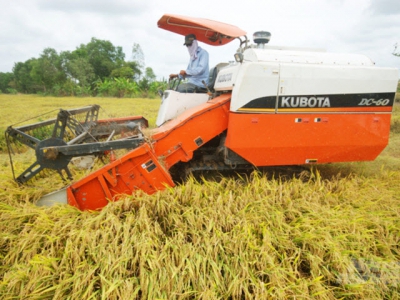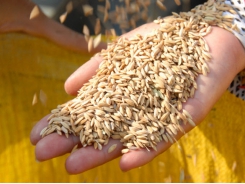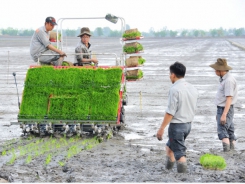Summer-autumn rice consumption in Mekong Delta provinces facing lot of difficulties

The harvesting, trade and transportation of summer-autumn rice crops continue facing many difficulties, possibly causing negative impacts to following seasons.
Problems relating to rice harvesting and the post-harvest process slowed down rice consumption and exports in the Mekong Delta provinces. Photo: Le Hoang Vu.
According to the Ministry of Agriculture and Rural Development, until August 12, Mekong Delta provinces and cities harvested 780,000 ha of summer-autumn rice with the productivity of about 5.8 tonnes per ha and a total production of about 4.524 million tonnes.
The harvesting time of summer-autumn rice would reach its peak within this month and finish in the middle of next month.
The implementation of a social distancing order under the Prime Minister’s Directive 16 in 19 southern localities has caused difficulties to Vietnam’s rice production, consumption, processing and exports.
In cases, rice was not transported from fields to plants or from plants to ports for export.
There has been a serious shortage of seasonal workers to harvest and carry the rice to boats. In other cases, rice-carrying boats were unable to move from an area to another, especially among localities.
Moreover, the summer-autumn rice is harvested when it rains a lot in the south. As a result, harvested rice need to be processed under a heating system. However, the transportation of rice from fields to plants was disrupted, causing the fresh rice to unprocessed and their quality reduce.
Rice processing plants have not received sufficient supply, which made them unable to complete rice export contracts.
As enterprises are implementing the “three on-site” model – providing workers food and stays at the plants’ campus to maintain production, less than half of their workers are working. As a result, enterprises saw a sharp decline in productivity.
Since localities imposed travelling restrictions from 6 pm to 6 am, rice transportation has been affected. Once the rice was stored on boats or cargoes overnight, its quality was partly reduced.
To plants or storehouses with COVID-19 infections detected, the health authority imposed a 14-day lockdown which, consequently, disrupted production chains.
The transportation of processed rice from plants to ports for export also face difficulties because of the shortage of drivers and porters.
In some localities, in order to get licences to drive boats to transport rice or control combined harvesters, drivers have to have a COVID-19 negative result certificate valid for only 72 hours – the time is not enough for them to carry rice from Mekong Delta province to HCM City-based ports.
Moreover, sea ships have been suspended amid the COVID-19 pandemic.
Despite authorities’ efforts to ensure smooth inter-provincial road and inland waterway transport, people still face many difficulties in transporting rice by boats at this time.
Risk of losing markets
According to members of the Vietnam Food Association, rice companies still have a high level of rice inventory although it’s time for regular inventory replenishment.
However, due to disrupted circulation and distribution, the companies failed to sell their rice products. Their capital flow is also stuck, so the companies are unable to continue buying more rice.
Costs incurred due to the implementation of social distancing order added a new financial burden for rice companies.
Although the State Bank of Vietnam asked its branches and commercial banks in localities to provide credit for rice purchasing and reserve, companies hardly access loans from commercial banks.
Rice traders now also hesitate in signing new export contracts because of difficulties in circulating and delivering rice at seaports.
The high gap between the offer rice prices and the prices at the delivery time created a high risk for both rice sellers and buyers.
If these problems remain unsolved, Vietnam faces a high risk of losing markets, particular its traditional markets like the Philippines, China, Malaysia.
Problems relating to rice harvesting and the post-harvest process slowed down rice consumption in the Mekong Delta provinces.
The quality of rice was reduced due to improper processes and disrupted transportation. Farmers are struggling to sell fresh rice in fields. Since May, the average price of fresh rice has dropped, from VND 6,200 per kg on May 1, VND 5,800 per kg on June 1 and VND 5,200 per kg on July 1 to only VND 4,700 per kilo on August 5.
Unable to sell fresh rice, unable to store the fresh rice properly due to rainy weather, seeing hike prices of agricultural inputs, farmers are now very worried. A concern about farmers stop growing rice or delaying growing rice in the next seasons has been raised.
Seeing difficulties in consuming summer-autumn rice, the Ministry of Industry and Trade has asked Prime Minister to direct ministries of agriculture and health to facilitate the inland waterway transportation for rice.
Local authorities should create more favourable conditions for rice traders to reach rice production areas to purchase.
The Ministry of Industry and Trade proposed two options.
Option 1: Health and transport authorities accept results of COVID-19 rapid tests at the hamlet/commune, register information, travel schedule that traders provide hamlet/commune authority. The same procedures are applied to porters who load the rice to boats.
Option 2: In case the trader agrees to provide rapid test kits at COVID-19 checkpoints on the river when the rice-carrying cargoes move through the checkpoints, all people on the boats/barges would get tested for SARS-CoV-2 with the rapid test kits. The boats/barges can pass the checkpoints if the escorting people are tested negative for the coronavirus.
Related news
Tools

Phối trộn thức ăn chăn nuôi

Pha dung dịch thủy canh

Định mức cho tôm ăn

Phối trộn phân bón NPK

Xác định tỷ lệ tôm sống

Chuyển đổi đơn vị phân bón

Xác định công suất sục khí

Chuyển đổi đơn vị tôm

Tính diện tích nhà kính

Tính thể tích ao



 Changing mindset in tea growing thanks to IPM
Changing mindset in tea growing thanks to IPM  Farmers encouraged to plant autumn-winter crops in dyke-protected…
Farmers encouraged to plant autumn-winter crops in dyke-protected…